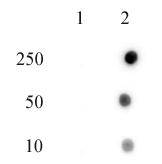Histone H4H18ph antibody (pAb)
Host / Isotype
Rabbit / IgG
Reactivity
Human, Wide Range Predicted
Applications
DB, WB
Cat No : 61411,61412 61411
Synonyms
Validation Data Gallery
Product Information
| Tested Applications | DB, WB |
| Tested Reactivity | Human, Wide Range Predicted |
| Host / Isotype | Rabbit / IgG |
| Class | Polyclonal |
| Type | Antibody |
| Modification | Phosphorylated |
| Immunogen | This antibody was raised against a synthetic peptide containing a 3-phosphohistidine analog at Histidine 18 of human Histone H4. |
| Full Name | Histone H4H18ph antibody (pAb) |
| Synonyms | Histone H4, H4H18ph, histone, H4, histidine, phospho, phosphorylation, antibody, polyclonal, pAb, wb, db, western blotting, dot blotting, sample |
| Molecular weight | 8 kDa |
| GenBank accession number | NP_778224 |
| RRID | AB_2793625 |
| Purification Method | None |
| Buffer | Rabbit serum containing 30% glycerol and 0.035% sodium azide. Sodium azide is highly toxic. This serum was depleted over unmodified peptide. |
| Storage | Some products may be shipped at room temperature. This will not affect their stability or performance. Avoid repeated freeze/thaw cycles by aliquoting items into single-use fractions for storage at -20°C for up to 2 years. Keep all reagents on ice when not in storage. |
Background Information
Histone H4 is one of the core components of the nucleosome. The nucleosome is the smallest subunit of chromatin and consists of 147 base pairs of DNA wrapped around an octamer of core histone proteins (two each of Histone H2A, Histone H2B, Histone H3 and Histone H4). Histone H1 is a linker histone, present at the interface between the nucleosome core and DNA entry/exit points; it is responsible for establishing higher-order chromatin structure. Chromatin is subject to a variety of chemical modifications, including post-translational modifications of the histone proteins and the methylation of cytosine residues in the DNA. Reported histone modifications include acetylation, methylation, phosphorylation, ubiquitylation, glycosylation, ADP-ribosylation, carbonylation and SUMOylation; they play a major role in regulating gene expression. Phosphorylation of histidines in Histone H4 has been known to occur in liver cells and may be associated with proliferation of hepatocytes during regeneration of the liver following damage.

